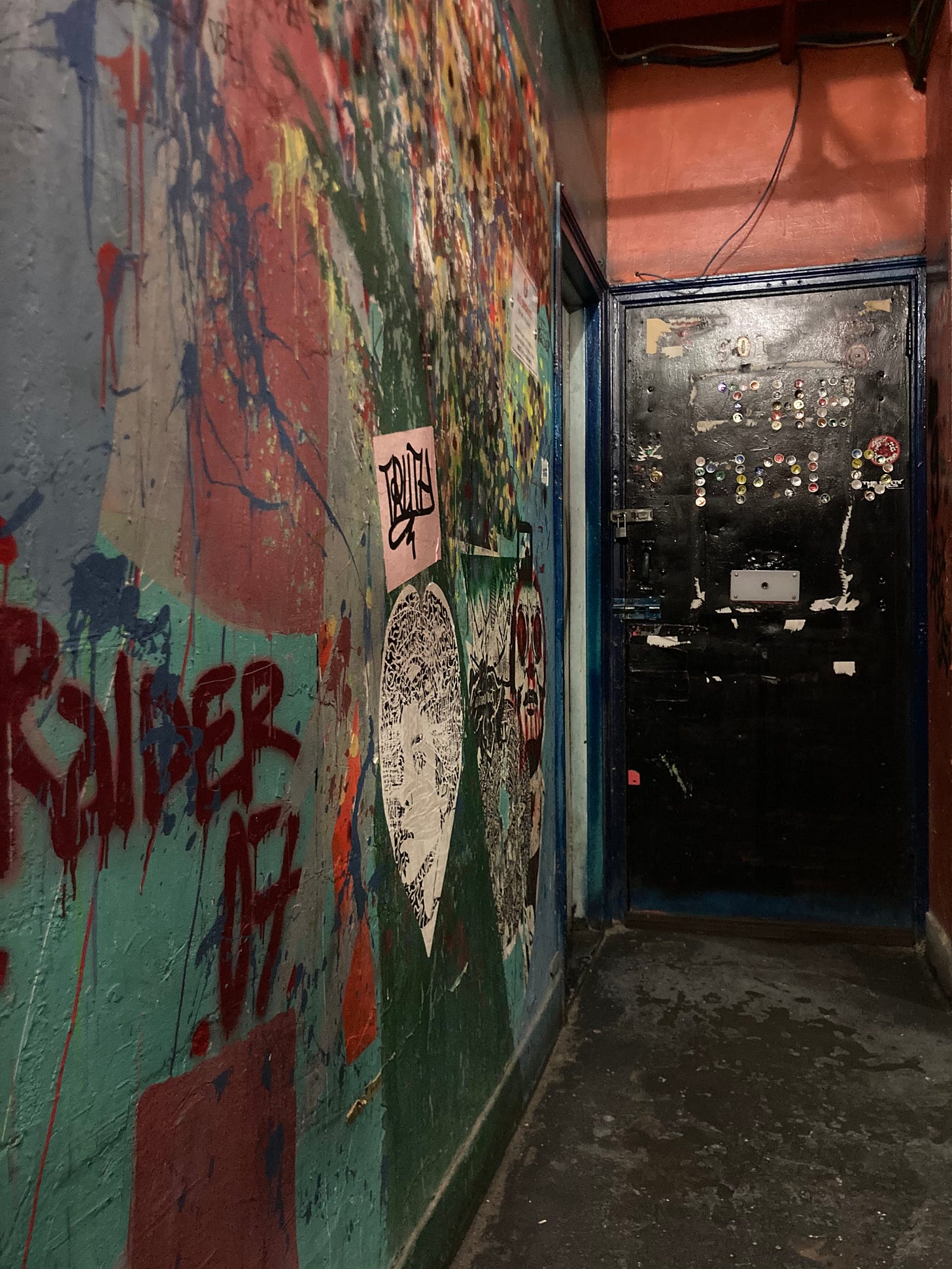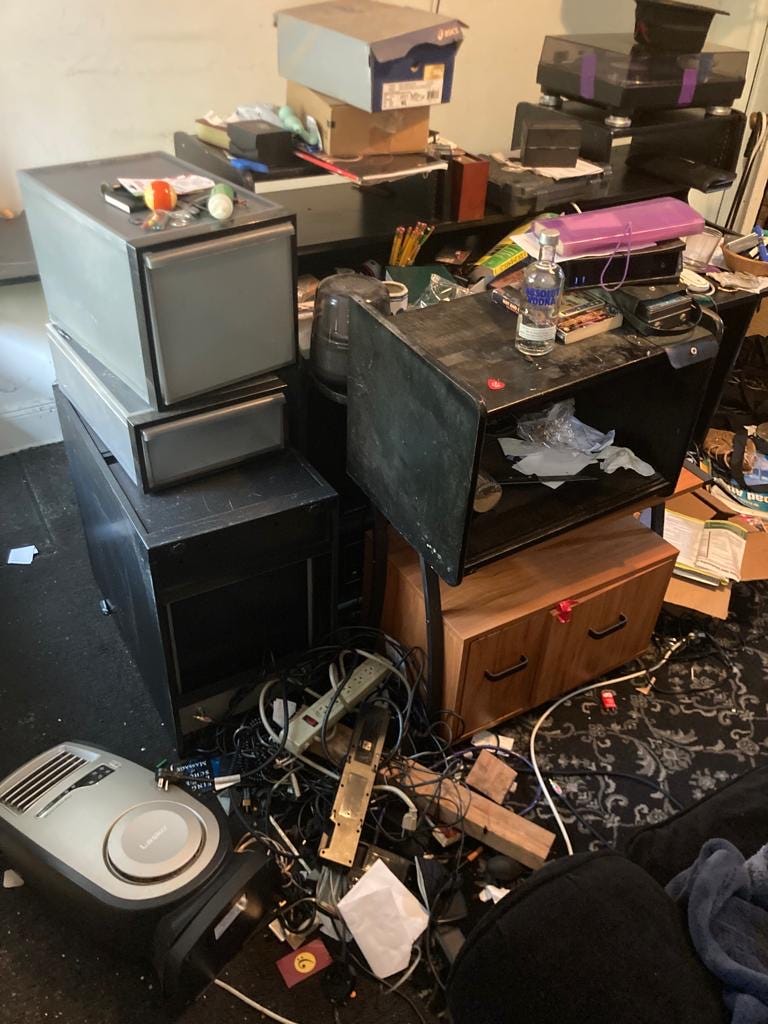How to Live Rent Free in New York City
They say you're not a real New Yorker until you've been to housing court.
When we left Italy, we were completely out of money. The pandemic took a scythe to small businesses and freelancers, alike. We were too young for retirement and too old to work at Auchan, even if such jobs were available to foreigners, which they aren’t. We were forced to sell all our belongings, including John’s beautiful antiques, and what we didn’t sell, we gave away. This near-Biblical purge was the only way we were going to make it home again.
John left first. The idea was for him to reestablish a foothold in New York, city of his birth, and find us a place to stay. I followed three weeks later. Unlike most people coming to New York, I had no burning desire to be there, no dreams about recreating Sex and the City girl-boss power lunches with women sporting Manolo Blahniks, and certainly no idea of the ordeals ahead. I was belched off the jetway at John F. Kennedy airport into a cloud of cannabis and car exhaust.
It was an alien and vaguely hostile moonscape I wandered through the night I landed. Even John felt like someone I needed to relearn. I’d left sleepy 15th-century Renaissance palazzos for blank-eyed skyscrapers and the madness of Times Square.
Through connections, John arranged for us to stay at an apartment in Brooklyn belonging to the son of a friend of his. The first few mornings as I woke up on our busted futon, I didn’t know where I was.
Almost immediately, I came down with pneumonia. John brought me to the hospital where I saw wall signs stating that anyone who assaulted medical personnel would face severe penalties. Who on earth assaults medical personnel? My recovery was slow, and the friend who was letting us stay in her son’s apartment surprised us by asking for $500 a week in rent. We paid, of course. What choice did we have?
Then I received word that my mother was dying, and I scrambled to Houston. The problem was, we’d run out of money and John had no place to stay. “I’ll figure something out,” he bravely assured me in the rattletrap shuttle to LaGuardia Airport. “Try not to worry.”
But I did worry. Over the next three-and-a-half months as I watched my mother shuffle off her mortal coil, John alternated between a couch at a friend’s atelier on 8th Avenue and a recording studio where a lot of sub-woofered music shook the thick concrete walls and scary-looking people congregated in the hallways at 3AM. John may have been a native son returned to his native soil, but he was still a man without a home, if not a country.
Then he caught a lucky break. An old friend of his I will henceforth refer to as “B” made good on a promise to move out of his East Village co-op apartment. He’d been talking about it for months—even before we left Italy. He wanted to move up to Michigan with his girlfriend.
Now, for those of you who, like myself, are unfamiliar with the co-op system in New York City, it works like this: You buy a specific apartment in a specific building, but you don’t own it outright. Instead, you own shares (ergo the name “co-op”). B bought his shares decades ago when the East Village was still a smoldering pile of rat droppings, drug dealers, and the men who raped Debbie Harry. He paid a couple hundred dollars a month, plus utilities, and was a member of a co-op board.
John moved in in the middle of June, and I arrived ten days later. Unfortunately, B did not leave the apartment in pristine condition. Trash was strewn everywhere. The bathroom was filthy. The couch had enough loose change in it to start a retirement fund. It took days for John to clean that place.
The apartment is small—a two-room studio with a pull-down Murphy bed in the kitchen, and then a postage-stamp-sized bathroom. We were happy to have it. And yet, every time we talked to B, he wanted more money. What started out as $1000 in rent grew to $1200, $1500, $1800, and then, alarmingly, $2300, which John negotiated down to $1800. Since the average cost of a market-rate apartment in NYC and most of the five boroughs is over $4500 a month, we still considered ourselves lucky, even as we were getting squeezed.
Per co-op rules, the first three months were supposed to be a rent free “guest period” while the co-op board debated whether they wanted to approve our sublet. B insisted we pay him the full $1800 under the table, without any knowledge of the co-op board. He was so paranoid about the board finding out he didn’t live in-state anymore, he insisted we take our phone meetings away from the building—not always convenient at 10PM in the East Village, where every corner bar has music blasting. We humored him. When the alternative is a piece of foam rubber on the floor of a Times Square music studio, you’ll strike any Faustian bargain.
Despite my shock at having to fork over $1800 for a closet in the East Village versus the $350 rent we paid for three frescoed ballrooms in Italy, I kept playing the game. Affordable housing in NYC is a unicorn story. A handful of people have it. But problems arose. B wouldn’t even give us the mailbox key. I was missing important appointments because I couldn’t access our mail. During one of his visits, which was taken at a neighborhood bar, he openly flirted with our twenty-two-year-old waitress—right in front of his girlfriend. It’s a behavior I especially deplore.
Matters reached a head when we had to pay back-to-back utility bills that had moldered in the mailbox we still didn’t have access to. I made my displeasure clear. B’s response was to schedule a Zoom meeting. Visibly nervous, he read from a prepared statement, insisting we move out of the apartment. He gave some vague reasons, but we knew it was really about my temerity in asking him for the mailbox key.
I refused to go.
Although we didn’t know it yet, a week or two prior, the co-op board had approved our lease. B kept trying to make us sign a document stating we’d never paid him during the three-month guest period. Since it amounted to perjury, I kept frantically stalling.
Two weeks later, around 9PM, we heard a knock on the door. If you live in NYC, you don’t answer the door unless you know who it is. It eventually dawned on me that B was trying to have us served. I texted him, but received no response. When a packet of “Notice of Termination” papers appeared on our door, we were appalled.
So, here’s another thing about New York City housing laws. They strongly favor the tenant. Even without a formal lease, after three months in the apartment, we were considered “tenants.” Legally, B couldn’t change the locks, stop paying the utilities, or get a marshal to remove us—even though we refused to pay a dollar more in rent.
Try pulling something like that in Texas. They’ll drag you out by your hair and kick your teeth in for good measure.
Friends told us to go to the courthouse at 111 Centre Street as soon as possible and request a pro-bono attorney. The weather was arctic. “Let’s wait,” John said. “This is a bad idea. We can come back when it isn’t so cold.” But I dug in my heels. That’s peak Stacey, in case you don’t know. Ride or die. Sure enough, that night I started coughing. The next day, I was back in the ER with pneumonia. Three weeks later, John got his first Covid. Three days after that, I got it, too, and wound up back in the hospital.
Before I had a chance to fully recover, our first court date arrived. It’s an interesting place, housing court. If courtrooms are the still-beating hearts of our legal system, hallways are its arteries, buzzing with grim-looking defendants, schlubby lawyers in cheap suits and thick New York accents, theatrical phone conversations, Styrofoam cups with lipstick prints, and scuffed linoleum tile. Every floor has a long window giving out over Lower Manhattan, a cityscape so familiar, it’s etched into our DNA.
I heard the most heart-wrenching stories. Single moms $11,000 behind on their rent. A mentally slow, drug-addicted ex-felon fresh out of prison struggling to understand the judge’s instructions. It never occurred to them to fight the system, whereas I, with my privilege and my “educated” English, was bristling with the righteous indignation of my cause.
But we couldn’t get an attorney to represent us. Even a dear friend of mine in Texas who had legal connections couldn’t find us an attorney. I spoke with countless “free legal counsel” joints before realizing that no one materially cared. It didn’t matter to them that our landlord had extorted money and was wrongly trying to evict us. All I heard was, “You should start looking for another apartment right away.”
Even if we’d had someplace to go, I wouldn’t have given up so easily. My character defect, one of many, is that I seem to like a fight when the odds are longest. I read everything I could about tenant law. It occurred to me that as defendants, we had the right to ask for and receive a jury trial. When I asked my friend in Texas, she said, “There’s no way he’s going to let this go to a jury trial.”
“Even though I have to represent myself, and I’m utterly clueless?” I asked her.
“A jury trial will cost him thousands of dollars in lawyers’ fees,” she said. “Trust me, he will do everything he can to avoid it.”
This meant filing endless papers. I went to the courthouse three consecutive days, submitting document after document. On no sleep, I schlepped over on my birthday to file our last paper before the deadline. We discovered that the co-op board had filed documents of their own against B, including a formal request that he relinquish his shares.
It's a strange feeling when an injustice has been committed against you, and you go out into the world to try to redress it. The things you think are important (B breaking the law) don’t seem to matter to anybody except you. John and I pored obsessively over the details. The level of stress and uncertainty was debilitating. It always is when you’re fighting to keep a roof over your head.
In April, we were back in housing court. B’s lawyer, an odious bridge troll of a woman, did everything she could to antagonize us.
“I’ve been practicing law for over thirty years,” she snapped at me in front of the county clerk. “Believe me, your case is hopeless.”
“Your client broke the law,” I replied. “Doesn’t it bother you that you’re representing the guilty party?”
She rolled her eyes. “Whatever.”
“Huh. Thirty years of law, and that’s your answer?” I shot back. “What a waste of an education.”
But B’s lawyer visibly stiffened when I told the judge we were asking for a jury trial. She knew B wasn’t going to go for it. The judge penciled us in for a pretrial date followed by a court date, warning B’s lawyer that pretrial would be her last opportunity to settle with us.
All we could do was go home, stress, and wait.
A month later, we returned for our pretrial date. B’s lawyer gave us a warm smile as she entered the courtroom. That’s when I knew.
We’d won.
She was buttering us up for a settlement negotiation.
I asked for a waiver of all past rent and an exit date of October 31st. She pretended that she didn’t know whether B would go for it. I recognize a bluff when I see one. She marched down the hall to make the phone call. She probably bought herself coffee and a Danish, maybe returned a few emails, just to make it look convincing. But she knew before she asked me that his answer was yes.
When everything is said and done, we will have managed one year’s free rent and utilities (roughly $25,200) in the most expensive city in the world.
It wasn’t just a major victory. It wasn’t even theoretically possible.
After that?
I don’t know what happens after that. We’re freelancers. With freelancers, it’s either feast or famine. Plus it’s hard to get a “straight” job after fifty, especially when your corporate resume is thin, and all you have to show for yourself is a bunch of books, albums, tours, and concerts. We apply for all the housing lotteries (it’s just like a state lottery, only you have less chance of winning.)
This is big bad New York City, and trust me when I tell you, only the rich survive. Or the resourceful.
In one year, I’ve been through three bouts of pneumonia, one hospitalized Covid (“If you die,” one of the residents asked me, “Do you want us to resuscitate you?”), and three colonoscopies (don’t ask). My poor mother passed away. We’ve fought tooth and nail just for the right to exist.
But sometimes, out of the darkness comes the dawn. I am different for the experience. Not tougher. For a sensitive soul, I can be very tough. Just aware of what an epic battle we are all facing as citizens of this country. How many of us are one paycheck away from disaster?
Millions.
And then this small victory.
That’s how the tsunami begins, by the way. The good tsunami, where everybody wakes up and realizes we’re in this together—us versus them, and by them I mean landlords, property developers, tech titans, and Wall Street overlords. Change begins at a granular level.
I’d like to believe we are a part of that.
Copyright © 2024 Stacey Eskelin








What an ordeal! I’m glad you stuck to your guns, and shot your way out of the bloody red tape. Your tenacity paid off in spades. I wish you and John well on your next adventure, without sheisters, smug lawyers, or hospital visits. May green pastures await. XO ❤️
All too familiar story to a NYer. Bless you for toughing it out. And by the way, even though you agreed to leave--on Halloween of all dates--you could weasel your way into a few more months before they could actually physically get rid of you. As you said: the laws strongly favor the tenant. I guess you're aware of that but would prefer, wisely, to cut your wins and leave well-enough alone.
I imagine that, if NY were more like Texas, we'd have another 250,000 homeless in the streets. My suggestion: get the hell out of Manhattan. My rent for a 1BR in Sunnyside is under 2,200--half the average in Manhattan. And as you know, we have a lovely authentic Italian restaurant two blocks away. Hope to see you kids the last half of June. xoxo